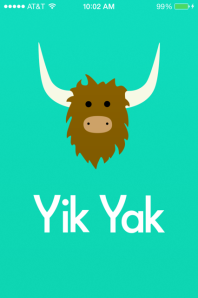Anisa Jibrell – General Assignment Reporter
The new trend, Yik Yak, or what students like Emma Cooke, sophomore and nursing major, refer to as “anonymous Twitter,” has become both a source of entertainment and the product of numerous cyberbullying concerns across campus.
Yik Yak is an application that allows users to post comments, or yaks, anonymously and have the ability to give yaks an up-vote or down-vote. The app permits students to enter a virtual discourse with people within close proximity, with a geographic radius of approximately one mile, according to the application’s website.
“It’s a complete waste of time,” said Sarah Martins, sophomore nursing major. “It’s disgusting.”
 Martins briefly downloaded the app when her friends informed her that she was being targeted by a user, or yakker, who posted a sexually suggestive comment about Martins, who then replied with her two cents and deleted the app.
Martins briefly downloaded the app when her friends informed her that she was being targeted by a user, or yakker, who posted a sexually suggestive comment about Martins, who then replied with her two cents and deleted the app.
According to statistics gathered from the Cyberbullying Research Center, girls are more likely to be the targets of cyberbullying in their lifetimes.
Despite one of Yik Yak’s disclaimer that reads, “You DO NOT bully or specifically target other yakkers,” students attest that it does not discourage users from posting threatening and sometimes discriminatory content on the local, anonymous newsfeed.
“It’s the ultimate bullying app, and there’s lots of discrimination,” said Martins. “I don’t find it funny at all.”
Ultimately, it’s up to the users if the anti-bullying rules are enforced, since a post can only be deleted if at least five users down vote it, according the app’s website. The app’s terms of service state that users must at least, be of college age, though there’s no way to confirm age or prevent minors from using the app.
Cooke admits that some users are self-absorbed and the Yik Yak environment creates a false sense of hilarity, and doubts that people would actually say the things they say if their names were attached to their yaks.
At the same time Cooke said there’s pressure to get likes. “There’s no point in saying anything if no one cares,” said Cooke. “Kind of like when you post a selfie on Instagram.”
Cooke said most of the yaks that she was unable to share, are “flat out mean” and hold sexual connotations.
“It’s like an uncensored version of twitter,” said Cooke. “Some of the yaks are just disgusting though.”
The application was launched by two college graduates in December of 2013.
Erin Roccapriore, senior recreational leisure major, believes students latched onto this new social media in particular, because the anonymous element made it stand out. Despite, the rules that encourage the establishment of a sense of community, students like Roccapriore find the efforts of the app creators to be frugal.
Under the application’s info it states, “Herds of yaks are strongest when they work together and watch each other’s backs.”
“I mean,” said Roccapriore, “I don’t know how you can be in a herd when nobody knows who anybody is.”
Though Yik Yak serves as breeding ground for cyberbullying, students such as, Lindell Douglas, junior and communications major, said, “like most things, there’s good things to it, and there’s bad things to it,” and cyber bullies aren’t the only ones who can gain an advantage from the social media platform.
“It gets people to open more,” said Douglas. “Shy people can express their feelings, so it’s not all bad.”




























































































[…] http://thesouthernnews.org/2014/09/30/yik-yak-causes-problems-among-students/ […]